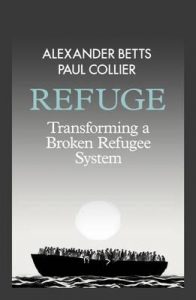Solving the global refugee crisis
Two of the world’s leading experts on migration and human displacement have laid out a ten-point plan to fix the world’s burgeoning refugee crisis.
Oxford Univeristy professors Alexander Betts and Paul Collier’s new book ‘Refuge: Transforming a Broken Refugee System’ is a compelling account of the current migrant crisis which shows why the global refugee regime is broken and how it could be fixed.
It argues that Europe is facing its greatest refugee crisis since the Second World War, yet the institutions responding to it remain virtually unchanged from those created in the post-war era.
As neighbouring countries continue to bear the brunt of the Syrian catastrophe, European governments have enacted a series of ill-considered gestures, from shutting their borders to welcoming refugees without a plan for their safe passage or integration upon arrival.
 With a deepening crisis and a xenophobic backlash in Europe, it is time for a new vision for refuge, Betts and Collier argue.
With a deepening crisis and a xenophobic backlash in Europe, it is time for a new vision for refuge, Betts and Collier argue.
The book offers innovative insights into how to more effectively meet this challenge, with an important new focus on international solidarity and refugee empowerment.
Going beyond the scenes of desperation which have become all-too-familiar in the past few years, Betts and Collier show that this crisis offers an opportunity for reform if international policy-makers focus on delivering humane, effective and sustainable outcomes – both for Europe and for countries that border conflict zones.
They argue refugees need more than simply food, tents and blankets, and research demonstrates that they can offer tangible economic benefits to their adopted countries if given the right to work and education.
The pair have laid out ten ways the worst refugee crisis in history could be tackled.
Focus on developing countries
“The real challenge is not in Europe. Only 10 per cent of refugees are in developed countries, and the focus on Europe has led us to neglect a parallel crisis: the dire situation of the 90 per cent of the world’s refugees in developing regions,” the professors say.
“More than 60 per cent of refugees are in just 10 safe-haven countries: Turkey, Lebanon, Jordan, Kenya, Uganda, Ethiopia, Iran, Pakistan, Tanzania and Chad. This is where we find the most vulnerable people.
“And yet for every £1 of public money spent by donor states on an asylum seeker who reaches Europe, we spend less than 1p on a refugee in a neighbouring host country. This neglect has led to declining conditions that are bad for refugees, create insecurity and contribute to onward movement.
“We need a massive increase in our development assistance contributions to those countries to make refuge sustainable,” they say.
Clarify the purpose of refuge
“In Europe and the US, refuge has become unnecessarily bound up with politically toxic debates relating to ‘migration’ and ‘globalisation’,” the pair say.
 “Properly understood, though, refuge is about something quite different: offering safe haven to people fleeing danger, and restoring their lives to normality as quickly as possible.
“Properly understood, though, refuge is about something quite different: offering safe haven to people fleeing danger, and restoring their lives to normality as quickly as possible.
“Refuge should mean providing three things: rescue and meeting immediate needs; autonomy by empowering people to help themselves through jobs and education; and an eventual route out of limbo by ensuring people can go home, or receive resettlement elsewhere if it becomes clear that going home is not likely to be an option in the foreseeable future.
“For most people, these purposes can be fulfilled close to home and should not require long and dangerous journeys. And the majority do not want to be migrants; when the UN Refugee Agency surveyed Syrian refugees about resettlement in Canada, more than 70 per cent said they preferred to stay closer to home,” Betts and Collier say.
Move beyond refugee camps
“The humanitarian system’s default response remains camps. These offer life-saving basics such as food, clothing and shelter. But they are often dehumanising, usually denying the right to work and freedom of movement. People get stuck in them for decades,” the professors say.
“A response designed just for the emergency phase can endure. Kenya’s Dadaab camps, for example, opened in 1992 and host 350,000 Somalis – a significant proportion of whom have been there ever since the camps were created.
“Unsurprisingly, a majority of refugees bypass camps entirely. And they are left with two equally problematic alternatives: to go to cities, where they give up assistance and often face destitution; or to embark on perilous journeys with people smugglers,” they say.
Allow refugees to work
“Refugees have skills, talents and aspirations. And yet, around the world, they face severe restrictions on the right to work,” Betts and Collier say.
“This undermines autonomy and dignity, and erodes people’s ability to help themselves and contribute to their host societies.
“The evidence shows that when refugees are given access to labour markets, it leads to “win-win” outcomes for both them and their hosts,” they say.
Ensure routes out of limbo
“People should not spend their lives as refugees. Ideally, they will be able to go home. But sometimes this is not possible within a reasonable timeframe,” the professors say.
“Three years of uncertainty may be reasonable; a decade is not. Once people have been in a safe-haven country beyond a certain “cut-off” time, they should be permanently integrated somewhere – whether in that country or another one,” they say.
Incubate post-conflict recovery
“How we treat refugees while they are in exile will shape what they do when they go home,” Betts and Collier say.
“If we can give them access to jobs and education in safe-haven countries, they will be better placed to return home and contribute to reconstruction once the conflict ends,” they says.
The pair cited the examples of companies such as Caterpillar, Benetton and Sony were forced to withdraw from Syria.
“Why shouldn’t these companies continue to employ Syrians on the other side of the Jordanian border and then relocate back when the war ends?” they said.
Send people back humanely
“Our refugee policies can only be effective against the backdrop of an effective immigration system. There is no universal right to migrate,” Betts and Collier say.
“But refugees have a right to migrate insofar as it is necessary in order to reach safety.
“Ideally, this will happen close to home, but occasionally it may not. In these rare instances, we have to offer asylum as a last resort.
“To sustain public confidence, our immigration system has to welcome those who are refugees but, for whatever reason, have not found safe haven nearer to home.
“But it must also devise ways to provide humane returns for those who either are not refugees or have already found adequate protection elsewhere,” they say.
Don’t rely on the UN refugee Convention 1951
“We have an international treaty that defines refugees and sets out their rights. But it was created for a different era – post-Second World War Europe – and it is now of declining relevance,” the professors say.
“More than half the world’s refugees are in countries that are not full signatories. Elsewhere, including in Europe, there is systemic non-compliance with the treaty.
“Furthermore, even when it is applied, its interpretation throws up inconsistent outcomes: if you are an Eritrean, you have a 24 per cent chance of being recognised as a refugee in France – and a 100 per cent chance in Sweden. This inconsistency stems from the refugee definition no longer being appropriate,” they say.
Reform the UN Refugee Agency
“The world needs a United Nations refugee agency to facilitate collective action by governments,” Betts and Collier say.
“But the current models of the UN High Commissioner for Refugees (UNHCR) need to be updated. In many contexts, the organisation is absent.
“In Turkey, for example, the largest refugee-hosting country in the world, fewer than 10 per cent of Syrian refugees get any assistance from the UNHCR or its operational partners.
“The agency is very good at running refugee camps and providing legal advice to states. But these are no longer the key skills needed to ensure refugee protection. The skills needed today are economic and political analysis – and yet the UNHCR has limited professional competence in these areas,” they say.
Address root causes
“The main cause of displacement today is state fragility. More than 50 per cent of refugees come from just three such countries,” the professors say.
“However, the international community has a poor track record in rebuilding fragile states. Many such governments have been through successive periods of internal armed conflict, leading to the repeated waves of internal and cross-border displacement.
“Emerging drivers of displacement, such as climate change, will disproportionately exacerbate refugee movements insofar as they affect already fragile states.
“If the world is serious about ending displacement, it will need to find better ways to bring peace and stability to situations such as the Syrian conflict,” they say.
Alexander Betts is professor of forced migration and international affairs, and Paul Collier is professor of economics and public policy – both at the University of Oxford.
Laurie Nowell
AMES Australia Senior Journalist












